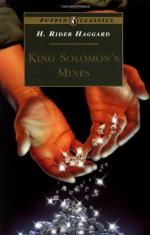In five minutes the fate of the battle was decided. Taken on both flanks, and dismayed at the awful slaughter inflicted upon them by the Greys and Buffaloes, Twala’s regiments broke into flight, and soon the whole plain between us and Loo was scattered with groups of running soldiers making good their retreat. As for the hosts that had so recently surrounded us and the Buffaloes, they melted away as though by magic, and presently we were left standing there like a rock from which the sea has retreated. But what a sight it was! Around us the dead and dying lay in heaped-up masses, and of the gallant Greys there remained but ninety-five men upon their feet. More than three thousand four hundred had fallen in this one regiment, most of them never to rise again.
“Men,” said Infadoos calmly, as between the intervals of binding a wound on his arm he surveyed what remained to him of his corps, “ye have kept up the reputation of your regiment, and this day’s fighting will be well spoken of by your children’s children.” Then he turned round and shook Sir Henry Curtis by the hand. “Thou art a great captain, Incubu,” he said simply; “I have lived a long life among warriors, and have known many a brave one, yet have I never seen a man like unto thee.”
At this moment the Buffaloes began to march past our position on the road to Loo, and as they went a message was brought to us from Ignosi requesting Infadoos, Sir Henry, and myself to join them. Accordingly, orders having been issued to the remaining ninety men of the Greys to employ themselves in collecting the wounded, we joined Ignosi, who informed us that he was pressing on to Loo to complete the victory by capturing Twala, if that should be possible. Before we had gone far, suddenly we discovered the figure of Good sitting on an ant-heap about one hundred paces from us. Close beside him was the body of a Kukuana.
“He must be wounded,” said Sir Henry anxiously. As he made the remark, an untoward thing happened. The dead body of the Kukuana soldier, or rather what had appeared to be his dead body, suddenly sprang up, knocked Good head over heels off the ant-heap, and began to spear him. We rushed forward in terror, and as we drew near we saw the brawny warrior making dig after dig at the prostrate Good, who at each prod jerked all his limbs into the air. Seeing us coming, the Kukuana gave one final and most vicious dig, and with a shout of “Take that, wizard!” bolted away. Good did not move, and we concluded that our poor comrade was done for. Sadly we came towards him, and were astonished to find him pale and faint indeed, but with a serene smile upon his face, and his eyeglass still fixed in his eye.
“Capital armour this,” he murmured, on catching sight of our faces bending over him. “How sold that beggar must have been,” and then he fainted. On examination we discovered that he had been seriously wounded in the leg by a tolla in the course of the pursuit, but that the chain armour had prevented his last assailant’s spear from doing anything more than bruise him badly. It was a merciful escape. As nothing could be done for him at the moment, he was placed on one of the wicker shields used for the wounded, and carried along with us.




